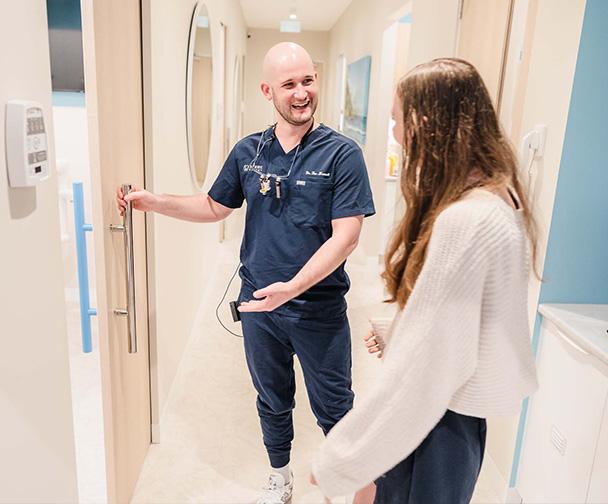Full Mouth Rehabilitation For A Functional, Beautiful Smile
Transform your oral health and appearance with our full-mouth rehabilitation. Through a comprehensive approach, this treatment plan restores comfort, function, and confidence.
Full-Mouth Rehabilitation,
Restoring Your Smile & Bite Function

How Full Mouth Rehabilitation Can Address Multiple Dental Concerns For A Complete Smile
Years of grinding, decay, gum disease, or old dental work wearing down can cause teeth to shift and break over time. These issues often lead to chronic jaw pain, recurring infections, and tooth loss. As problems build up over time, patients can feel overwhelmed managing frequent emergencies and experience a drop in self-confidence.
A full-mouth rehabilitation offers a structured approach to managing accumulated dental issues. It combines multiple treatments to address ongoing problems and stabilise oral health for long-term improvements.

Determining If You Are A Candidate For Full Mouth Rehabilitation Treatment
Evaluating suitability for full mouth rehabilitation depends on many factors, including oral health, functional needs, and goals. Below are the primary characteristics that determine if this is right for you:
- Candidates normally present with severe tooth wear, decay, or multiple missing teeth, impacting both function and aesthetics.
- Bite alignment issues, such as malocclusion or jaw discomfort, are often present and require adjustment through comprehensive treatment.
- Patients may have gum disease or other periodontal conditions that need management to stabilise oral health.
- Ideal candidates should be committed to long-term care and may require multiple treatments, including restorations, implants, or orthodontic adjustments.
What Are The Main Benefits Of Full Mouth Rehabilitation?
Our full-mouth rehabilitation provides significant improvements for extensive dental issues, enhancing both the functionality and aesthetics of teeth. Here are the benefits of undergoing this comprehensive treatment:
- Full-mouth rehabilitation improves chewing and speaking function by restoring balance to the entire bite.
- It addresses widespread dental issues, such as decay, damaged teeth, and gum disease, reducing the need for future complex interventions.
- Oral health is strengthened by addressing multiple problems at once, promoting long-term stability of teeth, gums, and jaw function.
- Patients benefit from an improved smile, achieving natural aesthetics that enhance social interactions and overall self-confidence.

A Guide To The Consultation Process For Full Mouth Rehabilitation Patients
Review of The Patient's Dental History
The initial consultation includes a detailed review of your dental and medical history to understand your health background and dental needs. The dentist assesses previous dental work and any ongoing issues and discusses your goals for full mouth rehabilitation, laying the groundwork for a custom treatment plan.
Conduct A Full Oral Examination
This comprehensive examination involves assessing the health of your teeth, gums, and the structure of your jaw. Techniques such as digital X-rays, 3D imaging, and moulds may be employed to provide a complete overview of your oral health, which is essential for formulating an effective treatment strategy.
Outline Possible Treatment Options
Following the examination, the dentist details various treatment plans, explaining the steps involved, the expected benefits, and the specific risks of each. This thorough discussion helps clarify how each treatment method targets your dental issues, providing the necessary information for you to consider your options.
Discuss Financial Planning and Cover
In this session, the dental team provides an itemised breakdown of the treatment costs, available payment options, and the extent of health fund cover. They provide comprehensive financial information, including potential out-of-pocket expenses, so you fully understand the financial aspects of your customised treatment plan.
Prepare for Treatment Procedures
The dentist and their team explain the preparations needed before initiating treatment. This includes arranging the dates for your sessions, discussing care needed after treatments, and setting clear expectations for each phase of the process. This is done so you are well-prepared for a smooth and informed treatment experience.
Full Mouth Rehabilitation Treatment Options and Pricing Guide
Dental Bridges
Starts at
$1,800 AUD
- Dental bridges restore proper chewing and speaking functions by filling gaps left by missing teeth.
- They prevent neighbouring teeth from shifting into empty spaces, maintain tooth alignment, and potentially avoid future orthodontic treatments like clear aligners or Invisalign.
- Bridges provide a durable option for tooth replacement, especially when implants are not viable due to bone density or health issues.
Dental Crowns
Starts at
$1,700 AUD
- Dental crowns stabilise weakened teeth by adding structural support, which helps prevent the need for more invasive treatments.
- They act as a protective barrier, shielding the tooth from external damage like decay, cracks, or wear over time.
- Crowns preserve the natural tooth, extending its lifespan and reducing the chances of needing extraction in the future.
Dentures
Starts at
$1,000 AUD
- Dentures replace missing teeth, allowing for improved chewing and clearer speech by providing functional support for everyday activities.
- They help maintain facial structure by preventing the sunken appearance that can result from tooth loss and bone deterioration.
- Dentures offer a removable, cost-effective option for tooth replacement, catering to both partial and full tooth loss cases.
Schedule Your Consultation Today
Experience Exceptional Dental Treatments for a Healthier, Brighter Smile

Frequently Asked Questions
How long does a full-mouth rehabilitation take to complete?
A full-mouth rehabilitation process can take between six months and 18 months to complete. The duration of this extensive treatment process depends on several key factors. These include:
- Complexity of dental issues:
Patients with more complex dental needs may require extended treatment periods to manage their conditions properly. - Overall oral health:
Those starting with poorer oral health may need additional preliminary treatments, which can prolong the total rehabilitation time. - Type of treatments required:
Different procedures, such as dental implants or orthodontic adjustments, have specific timelines that can affect the overall duration. - Patient’s healing response:
The rate at which a patient recovers from dental procedures significantly impacts the spacing of subsequent treatments. - Appointment scheduling:
Regular and timely appointments are essential; delays in scheduling can extend the process. - Technological and procedural adaptations:
Updates in dental technology or modifications in treatment plans due to new techniques can also alter the timeframe.
Discussing your specific dental and health profile with an experienced dentist at Azure Dental is advisable to receive a more precise estimate tailored to your situation.
What treatments are involved in full-mouth rehabilitation?
The full-mouth rehabilitation process encompasses several dental procedures designed to restore and enhance both the functionality and appearance of your teeth. This dental treatment approach focuses on comprehensive restorative dentistry to improve overall oral health. Here are the common treatments involved in full-mouth rehabilitation:
- Dental implants:
These serve as replacements for missing teeth. A titanium post is surgically placed into the jawbone, providing a stable base for a crown, which replicates the look and function of a natural tooth. - Dental crowns:
Crowns are custom-made caps designed to cover the entire tooth. They are used to restore a tooth’s shape, size, and strength and to enhance its appearance, especially after significant decay or damage. - Porcelain veneers:
These are thin layers of ceramic that are precisely fitted and bonded to the front of the teeth. Veneers are highly valued for enhancing the appearance of teeth with chips, stains, or gaps. - Dental bridges:
Bridges are used to fill the space where teeth are absent. They are anchored onto neighbouring teeth or implants, with artificial teeth spanning the gap and restoring dental function and appearance. - Orthodontics:
This category includes treatments like braces and clear aligners that align and straighten teeth. Orthodontic procedures help adjust irregular bites and improve dental health by making teeth easier to clean. - Teeth whitening:
This cosmetic treatment aims to brighten and whiten teeth from discolouration and staining. It is one of the most popular procedures for enhancing the aesthetic appeal of your smile. - Composite bonding:
This involves the application of a tooth-coloured composite resin to improve the look of discoloured, chipped, or unevenly spaced teeth. The resin is shaped and hardened with a special light, then trimmed and polished for a smooth finish.
Getting a full-mouth rehabilitation surgery not only enhances your smile but also significantly boosts your oral health. Each of these procedures contributes effectively, and an initial consultation at Azure Dental will help tailor the most suitable approach to your dental needs.
How do I know if I need full-mouth rehabilitation?
Determining if you need full-mouth rehabilitation surgery often begins with recognising specific dental concerns. Several signs may indicate the need for comprehensive dental treatment. These include:
- Extensive tooth loss:
Multiple missing teeth can compromise your chewing ability and facial structure. - Severe tooth decay:
Widespread decay affecting many teeth may require extensive restoration. - Advanced gum disease:
This condition can lead to tooth loss and requires comprehensive management. - Jaw pain and dysfunction:
Issues like TMJ disorders necessitate treatments that address both the teeth and jaw alignment. - Worn-down teeth:
Excessive wear from bruxism or other factors can alter the bite and require rehabilitation. - Persistent dental pain:
Ongoing discomfort or sensitivity in multiple teeth can be a sign of underlying issues.
If you are experiencing any of these problems, it might be time to consider full-mouth rehabilitation surgery. Consulting with a dentist at Azure Dental will provide you with a clear assessment and discuss suitable treatment options tailored to your needs.
How much does full-mouth rehabilitation cost?
The cost of full-mouth rehabilitation can start at $15,000. Several factors can influence the total expense of this comprehensive dental treatment. These factors include:
- The extent of treatment required:
More extensive damage or decay necessitates additional procedures, increasing the overall cost. - Type of materials used:
Higher-quality materials such as porcelain and ceramic for crowns or veneers tend to cost more. - Dental technology and techniques:
Utilising advanced technology and more sophisticated techniques may increase costs but often results in better outcomes. - Geographic location:
Costs can vary significantly depending on the region and the local pricing standards. - Dentist’s experience:
Dentists with more extensive experience may charge higher fees for their services.
Gaining an understanding of these factors can help you plan financially for the investment in your dental health. A consultation with our team at Azure Dental Inglewood can provide you with a specific quote based on a tailored treatment plan.
Is full-mouth rehabilitation covered by health funds?
Yes, full-mouth rehabilitation is often covered by health funds because it involves essential procedures that maintain overall oral health. This comprehensive care helps prevent further dental issues, which can lead to more severe health problems if not addressed. Health funds cover these rehabilitative services to support better long-term oral and general health outcomes, reducing future medical expenses.
Can full-mouth rehabilitation address both functional and cosmetic issues?
Yes, a full-mouth rehabilitation can effectively address both functional and cosmetic issues. This comprehensive treatment plan is designed to restore the mouth’s functionality, such as improving bite and chewing function. At the same time, it enhances the visual aspects of the teeth, like alignment, colour, and overall smile aesthetics. By integrating restorative and cosmetic procedures, our full-mouth rehabilitation in Inglewood creates a healthy and attractive dental appearance.
What is the difference between full-mouth rehabilitation and a smile makeover?
Full-mouth rehabilitation and a smile makeover are distinct dental treatment plans that serve different purposes. While both can enhance oral health and appearance, they vary significantly in their objectives, procedures, and scope.
Full-Mouth Rehabilitation
Objective:
Focuses on restoring the function, health, and structure of the entire mouth.
Key Features:
- Comprehensive approach:
Addresses multiple complex dental issues, including missing teeth, severe decay, gum disease, and bite problems. - Functional restoration:
Aims to improve chewing ability, bite alignment, and overall oral function, restoring health and comfort. - Medical necessity:
Involves treatments essential for oral health, such as dental implants, crowns, root canals, and periodontal therapy. - Multidisciplinary care:
This often requires a coordinated effort from different dental professionals to address various aspects of oral health.
Smile Makeover
Objective:
Primarily focuses on enhancing the aesthetic appearance of the smile.
Key Features:
- Cosmetic focus:
Aims to improve the look of teeth and gums, concentrating on visual aspects rather than functional problems. - Aesthetic treatments:
Involves procedures like teeth whitening, dental veneers, bonding, and contouring to create a more attractive smile. - Less invasive options:
This usually includes less extensive treatments that do not alter the natural tooth structure as much as full-mouth rehabilitation does. - Personal preference:
Driven mainly by the patient’s desire for cosmetic improvement rather than a medical need for oral health restoration.
Understanding the differences between full-mouth rehabilitation and a smile makeover can guide you towards the treatment that suits your needs. It’s important to consult with your experienced dentist to explore which approach aligns with your treatment goals.
How many appointments will I need for full-mouth rehabilitation?
You will usually need between 5 and 10 appointments for a full-mouth rehabilitation process, depending on the complexity of your case. The initial visit involves a comprehensive examination to assess your oral health and develop a customised treatment plan. Subsequent appointments will address different stages, including preparatory treatments, restorative procedures like crowns or implants, and fitting dental appliances.
The number of visits may vary based on factors such as healing time between procedures and the specific treatments required for your situation. Your dentist will outline the exact number of appointments after evaluating your dental needs.
Will I experience pain or discomfort during full-mouth rehabilitation?
Yes, you may experience some discomfort during full-mouth rehabilitation, but dentists use various methods to minimise pain. Local anaesthesia, sedation, or sleep dentistry can be used during procedures to keep you comfortable throughout the treatment. After the procedures, mild discomfort or sensitivity is normal and usually subsides within a few days.
Your dentist might recommend over-the-counter pain relief to manage any post-treatment discomfort. In cases of more complex procedures, your dentist will discuss any necessary pain management strategies with you. Regular follow-up appointments will help monitor healing and address any concerns about discomfort.
How long is the recovery time after full-mouth rehabilitation treatments?
The recovery time after full-mouth rehabilitation ranges from two weeks to six months. This timeframe varies depending on the specific treatments involved, particularly when dental implants are part of the treatment process. Simpler procedures like crowns or veneers usually require about two weeks for recovery, with mild discomfort that subsides quickly.
If dental implants are included, the healing period can extend to three to six months, allowing time for the jawbone to integrate with the implants. Your dentist will provide detailed aftercare instructions to support proper healing and reduce recovery time.
Can full-mouth rehabilitation improve my ability to chew and speak?
What are the benefits of full-mouth rehabilitation for my overall health?
There are numerous benefits of full-mouth restoration that can positively impact your overall health. By addressing various dental issues, this treatment can enhance both oral function and general well-being. Key benefits include:
- Improved digestion:
Properly aligned and restored teeth allow you to chew food more effectively, aiding digestion and nutrient absorption for better overall health. - Reduced risk of oral infections:
By addressing cavities, gum disease, and damaged teeth, rehabilitation lowers the risk of infections that can spread to other parts of the body. - Alleviated jaw pain:
Adjusting bite issues and restoring worn teeth reduces strain on the jaw, helping to ease chronic pain and discomfort. - Enhanced speech:
Restoring missing teeth and improving alignment helps you articulate words more clearly, which can boost communication and confidence. - Better gum health:
Full-mouth rehabilitation addresses gum disease by cleaning affected areas, reducing inflammation and minimising the risk of further complications. - Improved mental health:
A healthier, functional smile can increase self-esteem and reduce anxiety, leading to a positive impact on mental health. - Prevention of further dental issues:
Addressing dental problems early through rehabilitation prevents them from worsening, avoiding more complex treatments in the future.
Full-mouth rehabilitation is not just about aesthetics; it significantly improves various aspects of your health. Discussing your dental concerns with your dentist can help you explore how the benefits of full-mouth restoration can contribute to your overall well-being.
What should I expect during a full-mouth rehabilitation consultation?
During the consultation, you can expect several steps to create a personalised treatment plan. These include:
- Comprehensive oral examination:
The dentist will thoroughly examine your teeth, gums, and bite to assess the current state of your oral health. - X-rays and imaging:
Dental X-rays or 3D scans will be taken to identify underlying issues, such as bone loss or hidden decay. - Dental impressions:
The dentist may take impressions of your teeth to create models, which help in planning the necessary restorative treatment procedures. - Discussion of dental history:
You will discuss your dental history, including past treatments, ongoing concerns, and any symptoms you have been experiencing. - Treatment options overview:
The dentist will explain potential treatment options, covering what each procedure involves and how they address your specific needs. - Customised treatment plan:
A personalised treatment plan will be developed based on your oral health assessment, dental goals, and budget considerations. - Cost estimate and timeline discussion:
You will receive a detailed overview of the potential costs and timeline involved in completing your full-mouth rehabilitation.
This consultation sets the foundation for a successful rehabilitation process by considering all aspects of your oral health. It is important to voice any concerns or questions to help the dentist tailor the treatment to your preferences and needs.
How do I maintain my results after full-mouth rehabilitation?
There are several key steps to follow to protect your new dental work and reap the benefits of full-mouth restoration. Here is a detailed maintenance routine:
- Brush twice daily:
Use a soft-bristled toothbrush and fluoride toothpaste to clean your teeth and gums every morning and night. Spend at least two minutes brushing, focusing on all tooth surfaces to keep plaque and food particles at bay. - Floss daily:
Flossing helps clean between teeth and around dental restorations, where a toothbrush cannot reach. Use dental floss or interdental brushes to keep plaque in check and support gum health, reducing the risk of decay. - Rinse with an antibacterial mouthwash:
Incorporate an alcohol-free antibacterial mouthwash into your routine to reduce harmful bacteria and maintain fresh breath. Swishing for 30 seconds helps target areas that brushing and flossing might miss. - Wear a nightguard if recommended:
If you have a history of tooth grinding, wearing a custom-made nightguard protects your dental restorations from excessive force. This step helps extend the lifespan of crowns, veneers, and implants. - Attend regular dental check-ups:
Schedule check-ups every six months, or as advised by your dentist, to monitor the condition of your dental work. These visits help identify potential issues early and include professional cleanings to maintain oral health. - Avoid hard or sticky foods:
Hard foods like ice or sticky foods like caramels can damage dental restorations, so be mindful of what you eat. Opt for softer, healthier foods to protect the integrity of your rehabilitated teeth. - Limit sugary foods and beverages:
Sugary foods increase the risk of cavities, which can compromise your dental work. Choose water or low-sugar options to support long-term oral health.
By following this maintenance routine, you help preserve the results of your full-mouth rehabilitation and promote overall oral health. Consistent care and regular dental visits will support the longevity of your new smile and minimise future dental issues.
What are the risks or complications associated with full-mouth rehabilitation?
Full-mouth rehabilitation can greatly improve oral health, but like any dental procedure, it carries risks and complications. Here are some of the common risks and how they might occur:
- Tooth sensitivity:
After procedures like veneers, crowns, or bridges, some patients may experience increased tooth sensitivity. This can happen because the dental work may affect the tooth’s natural protective layer, exposing it to temperature changes. - Gum irritation or infection:
During rehabilitation, procedures like implants and crowns involve working near the gum line. Improper placement or inadequate healing time could cause gum irritation or lead to infection if not properly monitored and cared for. - Jaw pain or discomfort:
Full-mouth rehabilitation often changes the alignment of teeth, which can put pressure on the jaw joints. If the new alignment is not carefully adjusted, this can lead to jaw pain or discomfort, especially during chewing. - Dental implant failure:
If implants are part of the rehabilitation, there is a small risk of implant failure. This can occur due to insufficient jawbone density, improper placement, or poor oral hygiene, which may affect the implant’s ability to fuse with the bone. - Chipping or cracking of restorations:
Crowns, veneers, and bridges can chip or crack over time, especially if you chew on hard objects or grind your teeth. This risk increases if the materials used are not properly selected for your specific dental needs. - Allergic reactions:
Some patients may be allergic to certain dental materials used during rehabilitation, like metals in crowns or bonding agents. An allergic reaction can cause discomfort or swelling, requiring an adjustment in materials or additional treatment.
Although these risks exist, careful treatment planning and follow-up care can significantly reduce their likelihood. Discussing any concerns with your experienced dentist beforehand can help create a treatment plan tailored to your specific oral health needs.